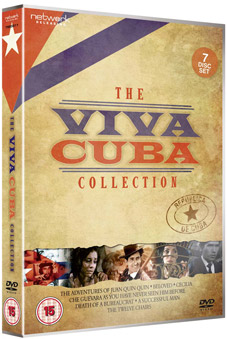Fidel Castro's revolution led to a rebirth in Cuban cinema, and now Network Releasing have announced the upcoming release of seven of these gems in a 7-disc set, The Viva Cuba Collection (15), which will be released on 27th September 2010 at the RRP £29.99.
These remarkable films range from the classic films of the 'golden age' following the Revolution of 1959 and the foundation of the Cuban Institute of Cinematographic Art and Industry, to more recent and equally powerful works from the 1970s and 1980s.

| Che Guevara as You Have Never Seen Him Before (Che Guevara Donde Nunca Jamas Se Lo Imaginan) |
| dir. Manuel Pérez Paredes – 1980 |
October 9th 1967. La Higuera, Bolivia. Shots ring out and a man dies. A man, but not the ideals and principles he stood for. The execution ensured that Ernesto “Che” Guevara de la Serna became, and remains, one of the most popular icons of socialist revolutionary principles throughout the world.
This exceptional documentary pieces together the story of Che's life, from early childhood to his revolutionary activities in Cuba, the Congo and Bolivia. Using previously unseen archive footage and stills, this remarkable diary of events includes interview footage with his father Ernesto, Fidel Castro and many other people who met and worked with him throughout his lifetime. |
| Special Features: A Photo Travels Around the World; Among Legends; October 1967. |
| |
| The Adventures of Juan Quin Quin (Las Aventuras de Juan Quin Quin) |
| dir. Julio García Espinosa – 1967 |
| Juan Quin Quin, a poor but shrewd farmer, survives in pre-revolutionary Cuba by living on his wits; as a church functionary, as a circus performer, as a bull-fighter and as a coffee planter who is swindled of his wages by the plantation owner. He even plays the part of Christ with a travelling theatre company. As the Revolution begins, he and his friend Jachero join the supporters of Fidel Castro and subsequently become ensnared by Batista troops. On a secret exploratory mission Jachero is killed and Juan looks back on their joint adventures together in the revolutionary cause... |
| |
| The Death of Bureaucrat (La Muerte de un Burocrata) |
| dir. Tomás Gutiérrez Alea – 1966 |
| When a well-loved sculptor is accidentally killed by the machine he created to mass-produce busts of nineteenth-century revolutionary hero José Martí, his family decides he should be buried gripping his union work permit as a symbol of his dedication to Castro's cause. Unfortunately, when his wife goes to receive her pension, the paperwork cannot be completed without her dead husband's work permit. Distraught, she enlists her nephew to exhume the body and so begins a maddening paper trail that ends in a hilarious climax exposing the insanity of bureaucracy. |
| |
| Twelve Chairs (Las Doce Sillas) |
| dir. Tomás Gutiérrez Alea – 1962 |
| On his mother-in-law's deathbed, Hippolito learns that to avoid their confiscation during the revolution, she hid her jewellery in one of the twelve English chairs that formerly stood in the blue salon of her villa. Seeing an opportunity to make some easy money, Hippolito wastes no time going in search of them. The villa itself, however, is now a retirement home and after running into Oscar, one of the villa's former servants, they join forces to search, but to no avail. Also, unknown to them, his mother-in-law had also confided the secret to someone else. |
| Special Feature: Por Primera Vez: a short film detailing the reactions of Cubans on watching a film for the first time. |
| |
| Beloved (Amada) |
| dir. Humberto Solás – 1983 |
| Havana, 1914. After the death of her father – a wealthy former slave trader – Amada lives on the estate with her unfaithful husband Dionisio and her blind mother. Trapped in a loveless marriage, she lives from day to day until a renewed meeting with her younger cousin, Marcial, stirs deep passions within her. Only in her dreams, however, does she dare toy with the idea of leaving with the revolutionary journalist. Meanwhile, Dionisio has coerced his mother-in-law to terminate the leases with the estate tenants and to sell out entirely to American interests – forcing the workers into a struggle for survival. Unable to carry on, they stage a hunger march on the villa... |
| |
| Cecilia (Cecilia Valdes) |
| dir. Humberto Solás – 1982 |
Cuba, 1830. Cecilia is the beautiful, proud and unusually light-skinned daughter of a poor native tailor and his wife. Brought up by her mother and grandmother as a courtesan in wealthy white society, Cecilia meets Leonardo Gamboa, the son of a slave owner and master of a vast estate who falls in love with her. Taking advantage of the situation, Cecilia agrees to his demands on condition that Leonardo hides a badly wounded member of the rebellion at his home. Meanwhile, Leonardo's brutal father begins to make arrangements for him to marry a woman from his own class, leaving him with no alternative but to make a choice...
Based on Cirillo Villaverde's famous nineteenth-century novel, it is set during one of Cuba's many battles for the abolition of slavery. |
| |
| A Successful Man (Un Hombre de Exito) |
| dir. Humberto Solás – 1985 |
| Spanning many decades of one wealthy Cuban family, A Successful Man follows the story of two brothers - Darío and Javier Arguelles - as they struggle to come to terms with their differing political beliefs before, during and after the Spanish Civil War. Whilst Dario becomes editor of a left-wing newspaper, Javier, who during his student days also sympathised with the Left, steers his way between the two fronts in the political field. Promoted by anarchists, he becomes a scrupulous senator. However loneliness is the price he has to pay for his political success... |
|